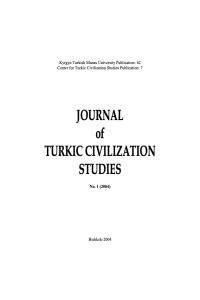Öz
Many in believe that the cause of Russia's lag vis a vis Europe was caused by the Tatar-Mongol invasions of the 13th century. Russia, under Mongol domination was isolated from European developments and therefore failed to participate in the crucial events of the period 1240-1480 that propelled Europe into the modern age. However, since Russia was practicing swidden (slash and burn) farming at that time, there was no subsistence basis on which to build a powerful state. Mongol taxation encouraged intensification of production, and by the 1460's movement on peasant mobility and the European 3-field system were being introduced into Russia, which became the economic bases of the Muscovite state. Thus without Mongol taxation, Russia might have remained in swidden for much longer than it did, with a consequent greater lag in development than was actually experienced.
Russia’s major historic problems have been its relations to the countries of the west, mainly an effort to keep up with them and avoid conquest, both military and cultural from that direction, and its relations to the countries to its southeast, by whom it was first dominated but which it later dominated itself, as part of the Russian Empire and Soviet Union. It is common opinion in Russia that its weakness vis a vis the West was caused by the Mongol domination of the 13th through 15th centuries. This ‘Mongol Yoke’ is thought to have isolated Russia from the West and therefore prevented it from participating in the Renaissance and Reformation as well as the commercial transformations that produced strong modern states in Western Europe. According to this scenario, Russia was thus left behind.
Kaynakça
- Gellner, Ernest, Plough Sword & Book: The Structure of Human History, Univ. of Chicago, 1988.
- Gilman, Antonio, “The Development of Social Stratification in Bronze Age Europe”, Current Anthropology, Vol 22, No. 1 (1981), pp. 1-9.
- Halperin, Charles, Russia and the Golden Horde, Indiana Univ. Press, Bloomington, 1985.
- Hellie, Richard, Enserfment and Military Change in Muscovy, Univ. of Chicago, 1971.
Öz
Many in believe that the cause of Russia's lag vis a vis Europe was caused by the Tatar-Mongol invasions of the 13th century. Russia, under Mongol domination was isolated from European developments and therefore failed to participate in the crucial events of the period 1240-1480 that propelled Europe into the modern age. However, since Russia was practicing swidden (slash and burn) farming at that time, there was no subsistence basis on which to build a powerful state. Mongol taxation encouraged intensification of production, and by the 1460's movement on peasant mobility and the European 3-field system were being introduced into Russia, which became the economic bases of the Muscovite state. Thus without Mongol taxation, Russia might have remained in swidden for much longer than it did, with a consequent greater lag in development than was actually experienced.
Russia’s major historic problems have been its relations to the countries of the west, mainly an effort to keep up with them and avoid conquest, both military and cultural from that direction, and its relations to the countries to its southeast, by whom it was first dominated but which it later dominated itself, as part of the Russian Empire and Soviet Union. It is common opinion in Russia that its weakness vis a vis the West was caused by the Mongol domination of the 13th through 15th centuries. This ‘Mongol Yoke’ is thought to have isolated Russia from the West and therefore prevented it from participating in the Renaissance and Reformation as well as the commercial transformations that produced strong modern states in Western Europe. According to this scenario, Russia was thus left behind.
Kaynakça
- Gellner, Ernest, Plough Sword & Book: The Structure of Human History, Univ. of Chicago, 1988.
- Gilman, Antonio, “The Development of Social Stratification in Bronze Age Europe”, Current Anthropology, Vol 22, No. 1 (1981), pp. 1-9.
- Halperin, Charles, Russia and the Golden Horde, Indiana Univ. Press, Bloomington, 1985.
- Hellie, Richard, Enserfment and Military Change in Muscovy, Univ. of Chicago, 1971.
Ayrıntılar
| Birincil Dil | İngilizce |
|---|---|
| Konular | Dilbilim (Diğer) |
| Bölüm | Araştırma Makalesi |
| Yazarlar | |
| Yayımlanma Tarihi | 30 Haziran 2004 |
| Yayımlandığı Sayı | Yıl 2004 Cilt: 1 Sayı: 1 |
Journal of Turkic Civilization Studies © 2022 by TUAUM is licensed under Attribution-NonCommercial 4.0 International
Journal of Turkic Civilization Studies by TUAUM is licensed under Attribution-NonCommercial 4.0 International


